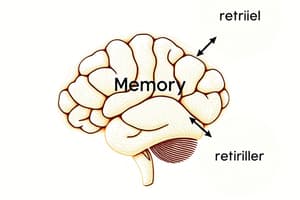Podcast
Questions and Answers
What is the primary role of attention in the memory process?
What is the primary role of attention in the memory process?
- It helps in the retrieval of memories.
- It automatically encodes all sensory information.
- It enhances long-term memory storage.
- It involves focusing awareness on a narrowed range of stimuli. (correct)
Which of the following best explains the serial position effect?
Which of the following best explains the serial position effect?
- It describes how memories change over time.
- It relates to the frequency of memory retrieval.
- It involves the use of mnemonic devices.
- It combines the primacy and recency effects on recall. (correct)
What characterizes sensory memory?
What characterizes sensory memory?
- It retains information for several minutes.
- It holds a brief, exact copy of sensory information. (correct)
- It has unlimited storage capacity.
- It is primarily responsible for reasoning and thinking.
What is the duration of short-term memory?
What is the duration of short-term memory?
How does working memory differ from short-term memory?
How does working memory differ from short-term memory?
Which type of long-term memory is responsible for personal experiences?
Which type of long-term memory is responsible for personal experiences?
What can help jog your memories during the retrieval process?
What can help jog your memories during the retrieval process?
What is a common reason for forgetting information?
What is a common reason for forgetting information?
What is the process of linking two events that occur close in time called?
What is the process of linking two events that occur close in time called?
Which type of conditioning involves associating a response with its consequence?
Which type of conditioning involves associating a response with its consequence?
What term describes the initial stage of learning something in classical conditioning?
What term describes the initial stage of learning something in classical conditioning?
In Pavlov's experiment, what was the food referred to as?
In Pavlov's experiment, what was the food referred to as?
Which of the following best explains 'Stimulus Generalization'?
Which of the following best explains 'Stimulus Generalization'?
What is the consequence of positive punishment?
What is the consequence of positive punishment?
Which type of reinforcement schedule involves reinforcement after a fixed number of responses?
Which type of reinforcement schedule involves reinforcement after a fixed number of responses?
Which theory proposed by Sternberg includes analytical, creative, and practical intelligence?
Which theory proposed by Sternberg includes analytical, creative, and practical intelligence?
What did Alfred Binet primarily aim to measure through his work?
What did Alfred Binet primarily aim to measure through his work?
What does the Flynn Effect refer to?
What does the Flynn Effect refer to?
What is the term for the removal of an aversive stimulus to strengthen a response?
What is the term for the removal of an aversive stimulus to strengthen a response?
What does 'Shaping' refer to in operant conditioning?
What does 'Shaping' refer to in operant conditioning?
According to behaviorism, which aspect is considered the only objective thing to study?
According to behaviorism, which aspect is considered the only objective thing to study?
What determines the range of an individual's intelligence according to the reaction range concept?
What determines the range of an individual's intelligence according to the reaction range concept?
Flashcards are hidden until you start studying
Study Notes
Memory
- Attention is vital for encoding memories
- Deeper processing leads to longer-lasting memories
- Visual imagery can enhance encoding
- Memory is better for words linked to the self
- The serial position effect describes the tendency to remember words at the beginning (primacy effect) and end (recency effect) of a list.
- Sensory memory holds a brief copy of what is seen or heard (icons for visual, echo for auditory).
- Short-term memory lasts for about 10 seconds and is very sensitive to interference and decay.
- Working memory is short-term memory combined with other mental processes, where most thinking occurs.
- Long-term memory has an unlimited capacity and holds information for extended periods.
- Declarative memory stores factual information.
- Semantic memory: General knowledge
- Episodic memory: Personal experiences
- Procedural memory stores memory for actions and skills
- Declarative memory stores factual information.
- Retrieval cues can jog memories.
- Context is a useful retrieval cue.
- Forgetting can occur due to failure to encode information, interference, decay, or retrieval failure.
- Multiple choice tests are recognition measures of retention.
- Essay exams are recall measures of retention.
- Clive Wearing experienced severe memory impairment, unable to form new memories. He had anterograde amnesia and retrograde amnesia.
Learning
- Learning is a relatively permanent change in behavior due to experience.
- Behaviorism focuses on observable behavior, not mental processes.
- Associative learning links two events that occur close in time.
- Conditioning is the process of learning associations.
- Classical conditioning is an association between two stimuli, anticipating a physiological response.
- Operant conditioning is an association between a response and a consequence, guiding future behavior.
Classical Conditioning
- Pavlov's experiment demonstrated classical conditioning.
- A neutral stimulus (tone) was paired with an unconditioned stimulus (food), leading to salivation (unconditioned response).
- After conditioning, the neutral stimulus (now conditioned stimulus) elicited salivation (conditioned response).
- Acquisition is the initial stage of learning.
- Extinction is the gradual weakening and disappearance of a conditioned response.
- Spontaneous recovery is the reappearance of an extinguished response after a period of no exposure to the conditioned stimulus.
- Stimulus generalization is the tendency to respond to stimuli similar to the conditioned stimulus.
- Stimulus discrimination is the ability to distinguish between a conditioned stimulus and similar stimuli.
Operant Conditioning
- Operant conditioning involves learning through consequences of voluntary behaviors.
- The Law of Effect states that behaviors leading to desirable effects are repeated, while those leading to undesirable effects are not.
- Acquisition is the formation of a new response tendency.
- Shaping involves rewarding behaviors that are closer to the desired behavior.
- Reinforcement strengthens a response.
- Positive reinforcement adds something desirable.
- Negative reinforcement removes something undesirable.
- Punishment weakens a response.
- Positive punishment presents an aversive stimulus.
- Negative punishment removes a rewarding stimulus.
- Reinforcement schedules determine when a response is reinforced.
- Continuous reinforcement rewards every response.
- Intermittent reinforcement rewards only some responses.
- Ratio schedules reinforce based on the number of responses.
- Fixed-ratio: Reinforcer after a fixed number of responses.
- Variable-ratio: Reinforcer after a variable number of responses.
- Interval schedules reinforce based on the time elapsed since the last reinforcement.
- Fixed-interval: Reinforcer after a fixed time interval.
- Variable-interval: Reinforcer after a variable time interval.
Observational Learning
- Observational learning involves learning by observing others.
- Bandura's Bobo doll study demonstrated that children modeled the behavior they saw in adults.
Intelligence
- Intelligence is the capacity to act purposively, think rationally, and deal effectively with the environment.
- General mental abilities form the core of intelligence.
- The "g-factor" is a general intelligence factor.
- Gardner's theory outlines 8 different intelligences.
- Sternberg's triarchic theory proposes three intelligences: analytical, creative, and practical.
- Alfred Binet developed the first intelligence test to measure children's mental age relative to their chronological age.
- The Stanford-Binet IQ test was based on Binet's work.
- The Wechsler Adult Intelligence Scale (WAIS) provides an overall IQ score and separate scores for verbal (language-based) and performance (nonverbal) intelligence.
- Intelligence is highly heritable.
- Twin studies show that identical twins have more similar IQs than fraternal twins.
- Adoption studies show that siblings reared together have more similar IQs than siblings reared apart.
- Environmental factors also play a role in intelligence.
- Environmental deprivation can negatively impact intelligence.
- Environmental enrichment can positively impact intelligence.
- The Flynn effect demonstrates that IQ scores have been steadily increasing across generations, likely due to factors like improved education and access to technology.
- Reaction range theory proposes that genetics set limits on intelligence, and environment determines where individuals fall within those limits.
Studying That Suits You
Use AI to generate personalized quizzes and flashcards to suit your learning preferences.



